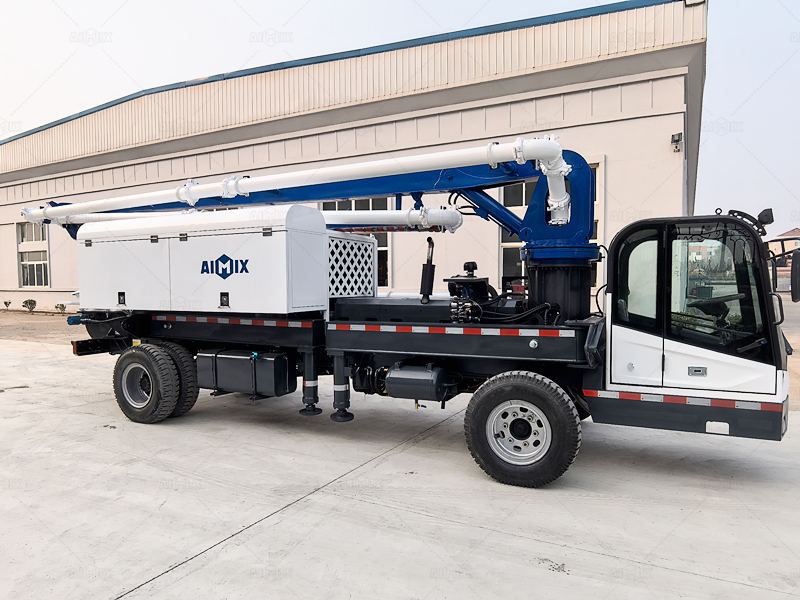Evaluating the Impact of Modular Design on Batching Plant Performance
- aimixglobal5
- Sep 6, 2024
- 4 min read
In the ever-evolving construction and manufacturing industries, efficiency and flexibility are paramount. Batching plants, which play a crucial role in mixing materials such as concrete and asphalt, are no exception. The advent of modular design has introduced significant advancements in batching plant performance, offering a range of benefits over traditional designs. This article evaluates the impact of modular design on batching plant performance, focusing on aspects such as scalability, efficiency, and cost-effectiveness.
Scalability and Flexibility
One of the most notable advantages of modular design in batching plants is its scalability and flexibility. Modular batching plants are constructed from pre-fabricated, standardized modules that can be easily assembled and disassembled. This modular approach allows for the expansion or reduction of plant capacity based on project requirements.
Scalability: For projects that experience fluctuating demands, modular batching plants can be quickly scaled up or down without major disruptions. Additional modules can be integrated to increase capacity, while excess modules can be removed if demand decreases. This flexibility ensures that the plant remains efficient and cost-effective throughout its operational life.
Flexibility: Modular design also provides flexibility in plant layout and configuration. Modules can be rearranged or reconfigured to suit specific project needs or site constraints. This adaptability is particularly valuable in dynamic environments where space and operational requirements frequently change.

Enhanced Efficiency and Performance
Modular design enhances the overall efficiency and performance of batching plants in several ways. The pre-fabrication of modules in a controlled environment ensures high-quality construction and reduces on-site assembly time.
Quality Control: Pre-fabricated modules are manufactured in a factory setting where quality control processes are rigorously applied. This results in consistent, high-quality components that contribute to improved plant performance and reduced maintenance needs.
Reduced Downtime: The modular assembly approach minimizes the time required for on-site construction and commissioning. Since modules are pre-tested and pre-assembled, the installation process is faster, leading to reduced downtime and quicker ramp-up times.
Optimized Workflow: Modular batching plants are designed with efficiency in mind. The standardized modules are optimized for smooth material flow and ease of operation. This optimization reduces bottlenecks and ensures that the plant operates at peak performance.
Cost-Effectiveness
Modular design can lead to significant cost savings in both initial investment and long-term operational costs. The cost-effectiveness of modular batching plants is attributed to several factors:
Lower Initial Investment: The use of pre-fabricated modules reduces the need for extensive on-site construction and customization. This leads to lower initial capital costs and faster project completion. Additionally, modular plants can be more affordable to transport and install compared to traditional fixed plants.
Reduced Maintenance Costs: The high quality and precision of modular components result in lower maintenance requirements. Standardized parts are less prone to wear and tear, reducing the frequency and cost of repairs. The ease of accessing and replacing modular components also contributes to lower maintenance costs.
Energy Efficiency: Many modular batching plants are designed with energy efficiency in mind. Modular designs often incorporate advanced technologies and systems that optimize energy use, leading to lower operational costs. Features such as energy-efficient motors and optimized heating systems contribute to overall cost savings. Are you looking for a cost-effective concrete batching plant solution to meet all your project needs? You are suggested to know Aimix batching plant company firstly for different plant types and features and then make a right choice.

Improved Safety and Compliance
Safety and regulatory compliance are critical considerations in batching plant operations. Modular design can enhance safety and ensure compliance with industry standards:
Safety Features: Modular batching plants are designed with built-in safety features, such as secure access points, protective barriers, and emergency shut-off systems. The standardized design ensures that safety protocols are consistently applied across all modules.
Regulatory Compliance: Modular plants can be engineered to meet specific regulatory requirements, including environmental and safety standards. The modular approach allows for easier integration of compliance measures, such as dust control systems and noise reduction technologies.
Ease of Inspection: The modular design facilitates easier inspection and maintenance. Standardized components and accessible layouts simplify the process of identifying and addressing potential issues, ensuring that the plant remains in compliance with regulatory requirements.
Adaptability to Different Applications
Modular batching plants are versatile and can be adapted to a wide range of applications. The modular design allows for customization to meet the specific needs of various industries, including construction, roadwork, and precast concrete production.
Customizable Modules: Modules can be tailored to handle different materials and mix designs. For example, a batching plant designed for concrete production can be easily modified to accommodate asphalt mixing or other materials. This adaptability makes modular plants suitable for diverse project requirements.
Rapid Deployment: Modular batching plants can be deployed quickly to new sites or temporary locations. This rapid deployment capability is particularly useful for projects with tight timelines or remote locations where traditional plant construction would be impractical.
Conclusion
The impact of modular design on batching plant performance is profound and multifaceted. By offering scalability, flexibility, enhanced efficiency, cost-effectiveness, and adaptability, modular batching plants provide a modern solution for the dynamic needs of the construction and manufacturing industries. The benefits of modular design, including faster installation, lower costs, and improved performance, make it a compelling choice for facilities looking to optimize their material handling operations.
As industries continue to evolve and demand more efficient solutions, modular batching plants represent a forward-thinking approach to meeting these challenges. The ability to customize, expand, and adapt modular plants ensures that they remain a valuable asset for any operation, providing long-term benefits and contributing to overall success.




Comments